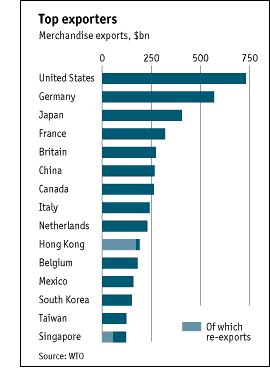

|
| weblog/wEssays | home | |
|
Which Country Is the World's Largest Exporter? (December 15, 200)  Which Country Is the world's largest exporter? China? Japan? Wrong. It's the good
old U.S. of A. Rather shocking, isn't it, considering all we hear about is how
our
trade deficit grows ever larger:
Which Country Is the world's largest exporter? China? Japan? Wrong. It's the good
old U.S. of A. Rather shocking, isn't it, considering all we hear about is how
our
trade deficit grows ever larger:
For October, imports of all goods and services rose by 2.7 percent to an all-time high of $176.4 billion, led by the surge in oil shipments. U.S. exports also rose but by a smaller 1.7 percent to $107.5 billion, reflecting in part a rebound in sales of commercial aircraft following the end of a strike at Boeing Co.The largest merchandise exporters (2004) as listed by NationMaster.com. (Note that the GDP dollar listed are derived from purchasing power parity (PPP): US Exports-Imports for 2004 from the Economic Policy Institute: Total U.S. imports last year were $1.764 trillion, 54% more than the $1.146 trillion in exports. To keep the trade deficit from widening, the growth rate of exports must exceed the growth rate of imports by 54%. Last year, import growth (16.3%) exceeded export growth (12.3%), and imports expanded by $247 billion, almost twice as much as the increase in exports of $126 billion.The ranked GDP of nations (the U.S. is by far the largest economy as measured by GDP) As with all statistics, you have to be careful to compare apples to apples. If you do, some interesting facts emerge. If you click on the first link above, you find that Germany outpaced the U.S. in merchandise exports in 2004, $893 billion to $795 billion. Yet total exports-imports as listed in the second quote indicate that U.S. exports were $1.146 trillion, not $795 billion. What gives? Well, the first graph and the first link are for merchandise exports only; but most nations also import and export services, such as financial and consulting services. When you combine goods and services, the U.S. is still the world's largest exporter. But why does the chart at the top right show the U.S. ahead of Germany even in merchandise? Simple. That graph is from 2001; in the past four years, German exports have grown far faster than U.S. exports of goods. Now take a look at the last link and compare Germany's economy to that of the U.S. It turns out Germany's GDP is only one-fifth that of the U.S.--meaning that Germany is heavily dependent on exports. Exports account for about a fourth of the German economy. As mentioned here in Meltdown in the E.U., this leaves Germany highly vulnerable to any slowdown in the global marketplace for its goods. In other words, if the world economy slows down, Germany will suffer an outsized decline, along with China and other nations dependent on exports for growth. Exports account for less than 10% of the U.S. economy, lessening the impact of a global slowdown. But no exporting nation will remain unscathed if the world economy slips on the banana peels of higher energy costs or the slowing of U.S. consumer spending. * * * copyright © 2005 Charles Hugh Smith. All rights reserved in all media. I would be honored if you linked this wEssay to your site, or printed a copy for your own use. * * * |
||
| weblog/wEssays | home |